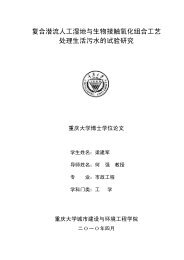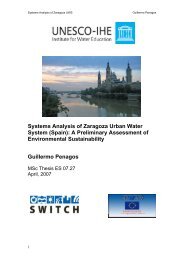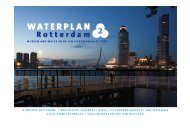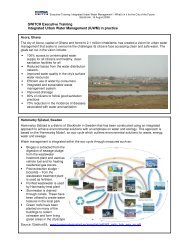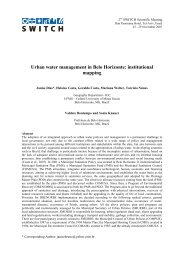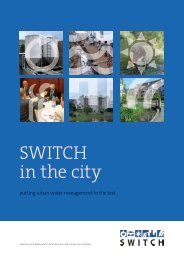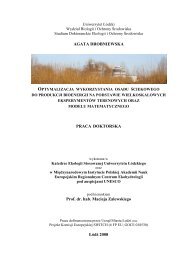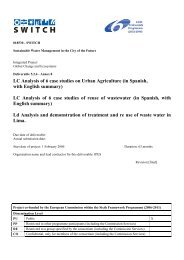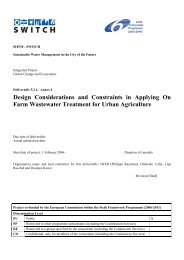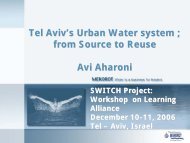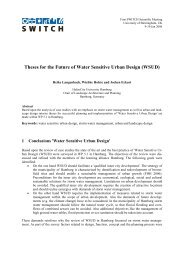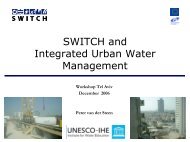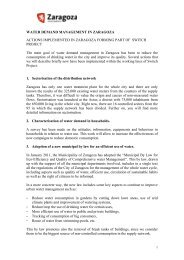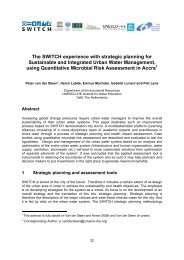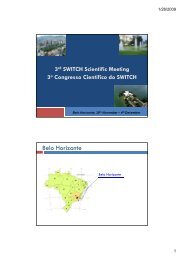Good practices for Social inclusion - Case studies and summary
Good practices for Social inclusion - Case studies and summary
Good practices for Social inclusion - Case studies and summary
Create successful ePaper yourself
Turn your PDF publications into a flip-book with our unique Google optimized e-Paper software.
Executive Summary<br />
Key words: IUWM, participatory processes involving marginalized groups, transparency<br />
water <strong>for</strong> livelihoods<br />
It is increasingly recognized that solutions to water shortages <strong>and</strong> water conflicts require<br />
integrated water resource management, participation by stakeholders from community to<br />
national level <strong>and</strong> increased accountability from governments to water users. This case study<br />
is about EMPOWERS, a learning <strong>and</strong> development project that aimed to improve the access<br />
of poor men <strong>and</strong> women to water. EMPOWERS ran from 2003 to 2007 in Egypt, Jordan <strong>and</strong><br />
Palestine, where water management <strong>and</strong> security are high priorities. The project aimed to<br />
improve water governance, with special attention to involving the most marginalized groups<br />
in participatory processes of problem analysis, planning <strong>and</strong> action. For this purpose multistakeholder<br />
plat<strong>for</strong>ms were established at local, intermediate <strong>and</strong> national level <strong>for</strong> planning<br />
<strong>and</strong> management of water resources <strong>and</strong> water services.<br />
Different groups within the targeted communities were engaged in problem analysis <strong>and</strong><br />
resolution. Jointly they identified pilot projects which would improve the daily situation <strong>and</strong><br />
livelihoods of the poorer community members.<br />
The project has also strengthened community organisations that can have an ongoing role in<br />
empowerment of socially excluded groups <strong>and</strong> in broader community development.<br />
Government decisions <strong>and</strong> action became more in<strong>for</strong>med by local realities. Participatory<br />
approaches <strong>and</strong> planning tools have helped generate knowledge, attitudes <strong>and</strong> <strong>practices</strong><br />
needed <strong>for</strong> better, stakeholder-led, water governance. Capacity building <strong>for</strong> improved<br />
planning, conflict resolution <strong>and</strong> engaging end-users is crucial to making the approach work.<br />
EMPOWERS shows the strong potential of people with often few means, little education <strong>and</strong><br />
limited negotiating power <strong>for</strong> problem solving <strong>and</strong> innovation if the process is well facilitated<br />
<strong>and</strong> organisational capacity is built. Underst<strong>and</strong>ing the divergent (<strong>and</strong> often conflicting)<br />
priorities <strong>and</strong> dem<strong>and</strong>s <strong>for</strong> water resources <strong>and</strong> effectively involving end users <strong>and</strong> local<br />
institutions are crucial elements of the project approach. Dem<strong>and</strong>-driven approaches that take<br />
into account processes of exclusion will likely be more sustainable <strong>and</strong> meet the practical<br />
needs of the poorest <strong>and</strong> least powerful. These lessons on social <strong>inclusion</strong> are relevant <strong>for</strong><br />
SWITCH <strong>and</strong> many other projects working towards sustainable Integrated Water Resource<br />
Management (IWRM).<br />
For more in<strong>for</strong>mation please contact: Carmen Dasilva (dasilva@irc.nl ) or Joep Verhagen<br />
(verhagen@irc.nl) who leads the SWITCH Work Package on <strong>Social</strong> Inclusion.<br />
SWITCH (Sustainable Water Management Improves Tomorrow‘s Cities‘ Health) is a research partnership supported by the European<br />
Community (Framework 6 Programme) <strong>and</strong> its partners www.switchurbanwater.eu/learningalliances<br />
108



